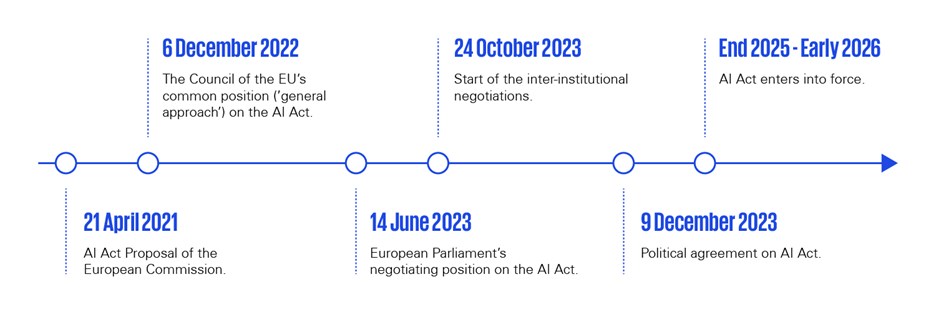

KPMG Law Belgium: Your Legal GPS through the AI landscape

*This title was generated with the help of AI.
Artificial Intelligence (AI) has been on the rise for a long time but has truly emerged as the buzzword in the past year. It goes without saying that the use of AI also brings numerous legal challenges and the demand for adequate regulation is growing louder. The AI Act, an initiative by the European Union (EU), is widely recognized to become the world’s first comprehensive legal framework for AI. Introduced by the European Commission in April 2021, its remarkable journey towards adoption is now nearing its conclusion. The last trilogue took place on 6 December 2023 and spanned no less than 38 hours before a provisional agreement on the proposal on harmonized rules on AI – the so-called AI Act – was reached by the Council and the European Parliament on 8 December 2023. The agreed text still needs to be formally adopted by both the European Parliament and the Council to become EU law. The Parliament’s Internal Market and Civil Liberties committees will first vote on the agreement at their forthcoming meetings end of January 2024. It is expected that the AI Act will come into force approximately by the end of 2025 or early 2026. However, potential delays remain a possibility.


The AI Act is set to have three main objectives: (i) safeguarding EU citizens against AI misuse, (ii) ensuring transparency and trust, and (iii) cultivating innovation and competitive growth within this regulatory framework. The AI Act implements a risk-based approach, categorizing AI systems into four distinct categories based on risk levels: unacceptable-, high-, limited-, and minimal-risk. Various requirements will apply, depending on the category, including transparency obligations, implementing a risk management system, data governance, human oversight, conformity assessments, registration, and more. This comprehensive legislation will span across all entities involved in AI, such as developers, users, importers, distributors, and manufacturers of AI systems. Violations may face penalties, potentially reaching up to 35 million euros or up to 7% of the total worldwide annual turnover for the preceding financial year – whichever amount is higher – thus exceeding even the penalties outlined in the General Data Protection Regulation of 27 April 2016, known as the GDPR.
The upcoming AI Act stimulates increasing research into the impact of AI on legal concepts in various legal domains.
Our Intellectual Property, ICT & Data Protection team stands ready to address the full spectrum of legal requirements associated with the development, use and manufacturing of AI systems. Considering recent copyright infringement cases related to AI-generated content, a profound comprehension of intellectual property rights will prove of utmost relevance. Furthermore, this team is prepared to help navigate the intricate intersection between GDPR and the AI Act, as AI systems rely heavily on (personal) data.
Moreover, our Business & Commercial Law team adeptly refines contracts to align with the upcoming AI Act standards wherein the potential influence of so-called transparency and disclosure obligations (including the impact of consumer protection laws) should certainly be taken into consideration. Furthermore, the AI Act will most likely also introduce an AI Code of Conduct for the voluntary application of specific requirements related to environmental sustainability, stakeholder participation, diversity, and more. Our teams can provide invaluable assistance with drafting such documents.
Furthermore, the AI Act has a substantial impact on competition law, requiring companies with high-risk AI systems to disclose certain data to national authorities. This data may be subsequently shared with national competition agencies and/or the European Commission when it may be of interest to them, significantly altering the amount of data available to authorities and potentially exposing businesses to antitrust measures. Our Business & Commercial Law team remains up to date on evolving national practices, guiding you in mitigating your business’s exposure to these risks.
While the liability framework related to AI remains ambiguous, now is the time to proactively assess potential risks and critical factors. It is crucial to continuously monitor both EU and national legislation developments surrounding AI liability, recognizing pivotal factors such as burden of proof, partial liability in AI-assisted decision-making or actions, product liability, and more. Should litigation arise from any of the aforementioned aspects, our Litigation team is well-equipped to navigate and manage such legal challenges effectively.
In addressing AI challenges within the financial sector, our Banking and Finance experts specialize in providing customized guidance. This is a crucial aspect, given that numerous AI systems used by financial service providers will be qualified as high-risk systems subject to the most onerous requirements under the AI Act. Furthermore, the interaction between the AI Act and other financial services regulations, existing and emerging, such as the Digital Operational Resilience Act (DORA), will need to be thoroughly analyzed. Moreover, our Banking & Finance team can provide insight and guidance into the roles of financial supervisory authorities and the European Central Bank in applying the AI Act, clarifying how their obligations will impact financial sector entities.
The implementation of the AI Act will also introduce a variety of corporate and governance concerns. The vast potential AI offers in this realm is matched by the accompanying risks. While AI holds immense potential in facilitating pivotal decision-making for boards of directors by providing objective data and / or decision-making tools, the lack of transparency to shareholders regarding how AI and/or the board reach specific decisions poses a risk, especially in view of directors' liability. Additionally, determining broader liabilities in scenarios where decisions involve AI assistance or are solely AI-driven, often remains ambiguous. Our Corporate and M&A team can offer advice, guidance, and even support in potential litigation arising from these complexities.
Similarly, we can help you assess the implications of any overlapping AI initiatives, for example as between the AI Act and other (future) AI initiatives around the world. The breadth of the territorial scope of the AI Act, and its possible extra-territorial implications (e.g., for AI systems from third country firms placed in the EU, or for complex supply chains involving non-EU entities using AI systems), could result in conflict of laws issues that we can help you identify, mitigate and/or resolve.
As legal advisors, our role is to ensure you remain well-informed about the evolving legal landscape, particularly concerning the AI Act. Stay up-to-date with us and get in touch if you need tailored legal advice or support. We can help you understand, comply with, and navigate the legal landscape surrounding AI, as it continues to reshape numerous sectors.
The rapid evolution of AI demands proactive legal guidance. Don’t miss the opportunity to stay ahead in this transformative era. Stay connected with us to ensure your compliance and success in an AI-driven future.








